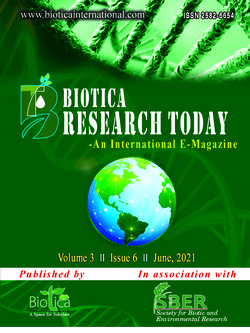
Tulsi (Ocimum tenuiflorum): The Natures Gift to Mankind
Debarshi Mahato
Institute of Agriculture Science, Siksha ‘O’ Anusandhan University, Bhubaneswar, Odisha (751 003), India
DOI: NIL
Keywords: Antioxidants, Holy basil, Ocimum tenuiflorum, Tulsi
Abstract
Tulsi, commonly known as "Holy Basil," is a well-known herb in Indian Ayurvedic medicine and has become a popular supplement owing to its multiple health advantages. Tulsi may benefit those suffering from type 2 diabetes by reducing blood sugar levels due to hypoglycaemic properties. It provides more antioxidants, which lowers the risk of cardiovascular disease. It comprises phytochemicals which fully prevent against skin, lung, and oral cancer. It seems to have anti-inflammatory properties that aid in the reduction of inflammation and high blood pressure. Though Tulsi is generally safe for most people, certain individuals should avoid using it unless allowed by their healthcare professional.
Downloads
not found
Reference
Gupta, S., Prakash, J., Srivastava, S., 2002. Validation of traditional claim of Tulsi, Ocimum sanctum Linn. as a medicinal plant. Indian Journal of Experimental Biology 40(7), 765-73.
Pattanayak, P., Behera, P., Das, D., Panda, S., 2010. Ocimum sanctum Linn. A reservoir plant for therapeutic applications: An overview. Pharmacognosy Reviews 4(7), 95-105.
Petruzzello, M., 2020. Holy basil. Encyclopedia Britannica. September 8, 2020. https://www.britannica.com/plant/holy-basil
